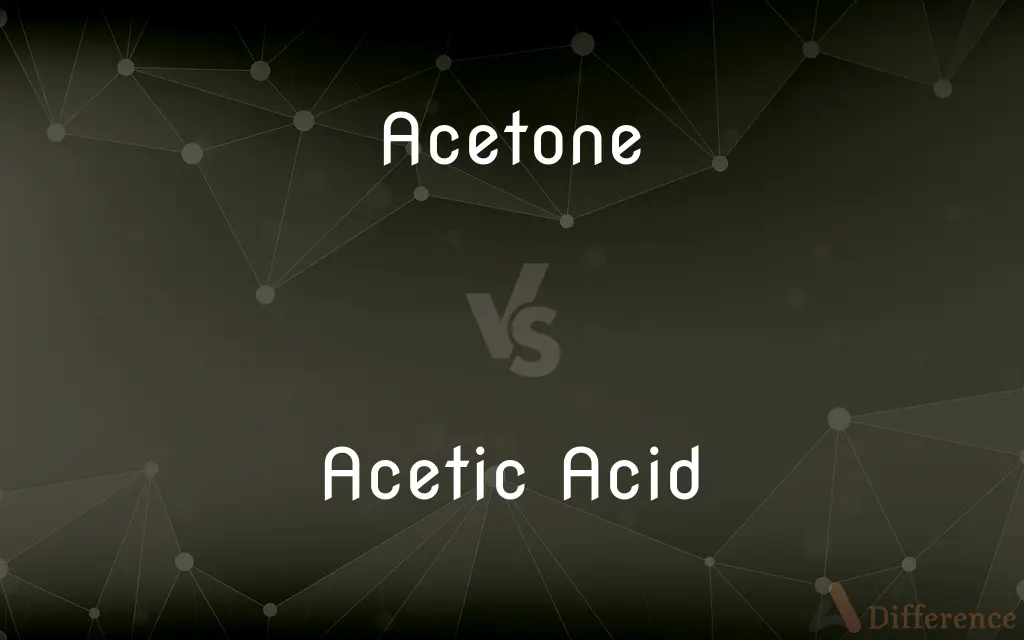Acetone vs. Acetic Acid — What's the Difference?
By Fiza Rafique & Urooj Arif — Published on March 6, 2024
Acetone is a volatile, colorless solvent used in industry and nail polish remover, whereas Acetic Acid is a sour-tasting liquid that acts as vinegar's main component and an industrial chemical.

Difference Between Acetone and Acetic Acid
Table of Contents
ADVERTISEMENT
Key Differences
Acetone and Acetic Acid are both organic compounds with significant roles in both industrial applications and everyday life. Acetone, with its chemical formula C3H6O, is known for its excellent solvent properties, making it invaluable in the manufacturing of plastics, fibers, and drugs. It's also widely recognized for its use in nail polish removers and as a paint thinner.
Acetic Acid, on the other hand, is best known for its presence in vinegar, with a concentration of about 5-8% in household vinegar. Its formula is C2H4O2, and it serves crucial roles in the production of vinyl acetate monomer (VAM), an essential precursor for various polymers and resins.
One of the key distinctions between Acetone and Acetic Acid lies in their functional groups and resulting chemical properties. Acetone is the simplest and most important member of the ketone family, characterized by a carbonyl group (C = O) bonded to two hydrocarbon groups. Acetic Acid is a carboxylic acid, containing a carboxyl group (COOH) that gives it acidic properties. This difference in functional groups leads to differing behaviors in chemical reactions, with Acetone being a potent solvent and Acetic Acid acting as a weak acid.
In terms of physical properties, Acetone is noted for its ability to dissolve in water, alcohol, and oil, making it a highly versatile solvent. It evaporates quickly and is highly flammable. Acetic Acid, while also soluble in water, exhibits strong acidic characteristics and has a pungent, vinegar-like smell. Its acidic nature makes it effective not only as a household vinegar but also in industrial processes where pH adjustment is necessary.
The applications of Acetone and Acetic Acid diverge significantly due to their chemical differences. Acetone's rapid evaporation rate and solvent capabilities make it ideal for use in the cosmetics industry, particularly in nail polish removers, as well as in laboratories for cleaning glassware. Acetic Acid's applications span from culinary uses, given its role in vinegar, to industrial applications, such as the synthesis of chemicals and plastics, showcasing its versatility beyond just food additive.
ADVERTISEMENT
Safety and handling of these compounds also differ; Acetone's flammability requires careful storage and handling to prevent fire hazards. Acetic Acid, particularly in concentrations higher than household vinegar, can cause burns and should be handled with protective equipment to avoid skin or eye contact.
Comparison Chart
Chemical Formula
C3H6O
C2H4O2
Functional Group
Ketone (carbonyl group)
Carboxylic acid (carboxyl group)
Solubility
Soluble in water, alcohol, and oil
Soluble in water, exhibits acidic properties
Main Uses
Solvent in industry, nail polish remover
Vinegar, industrial chemical production
Physical State
Volatile, colorless liquid
Colorless liquid with a pungent smell
Flammability
Highly flammable
Less flammable, but corrosive
Applications
Plastics, cosmetics, pharmaceuticals
Food industry, polymer and resin production
Compare with Definitions
Acetone
Acetone is a powerful solvent used in many industrial processes.
Acetone dissolves epoxy for cleaning purposes.
Acetic Acid
Acetic Acid can be used as a household cleaner.
Diluted Acetic Acid cleans windows without leaving streaks.
Acetone
It is highly volatile and evaporates quickly.
Acetone spills evaporate rapidly from surfaces.
Acetic Acid
It is used in chemical synthesis and industrial processes.
Acetic Acid is a starting material for synthesizing aspirin.
Acetone
It is a key ingredient in nail polish remover.
Acetone effectively removes nail polish without damaging the nail.
Acetic Acid
It is used in the production of synthetic fibers and plastics.
Acetic Acid is a key raw material in making polyester fibers.
Acetone
Acetone is used in the production of plastics and synthetic fibers.
Acetone is a solvent in the manufacturing of Plexiglas.
Acetic Acid
Acetic Acid serves as a food preservative due to its antibacterial properties.
Acetic Acid is used to preserve pickles.
Acetone
Acetone is used for degreasing and cleaning in the automotive industry.
Mechanics use acetone to clean engine parts.
Acetic Acid
Acetic Acid is the main component of vinegar, aside from water.
Acetic Acid gives vinegar its sour taste and pungent smell.
Acetone
A colorless, volatile, extremely flammable liquid ketone, C3H6O, widely used as an organic solvent. It is one of the ketone bodies that accumulate in the blood and urine when fat is being metabolized.
Acetone
(organic compound) A colourless, volatile, flammable liquid ketone, (CH3)2CO, used as a solvent.
Acetone
A volatile liquid consisting of three parts of carbon, six of hydrogen, and one of oxygen; pyroacetic spirit, - obtained by the distillation of certain acetates, or by the destructive distillation of citric acid, starch, sugar, or gum, with quicklime.
Acetone
The simplest ketone; a highly inflammable liquid widely used as an organic solvent and as material for making plastics
Common Curiosities
Is Acetone more flammable than Acetic Acid?
Yes, Acetone is highly flammable and poses a greater fire risk than Acetic Acid.
Why is Acetone a good solvent?
Acetone's effectiveness as a solvent is due to its ability to dissolve many organic compounds and its fast evaporation rate, making it ideal for quick drying.
Can Acetic Acid be used to remove nail polish?
Acetic Acid is not effective as a nail polish remover like Acetone because it lacks the solvent strength necessary to dissolve the polymers in nail polish.
Can Acetic Acid neutralize bases?
Yes, as an acid, Acetic Acid can neutralize bases, producing water and a salt in the process.
Is Acetone safe for consumption?
Acetone is toxic and should not be ingested. Inhalation of high concentrations or prolonged skin contact can also be harmful.
Can both compounds be found in household products?
Yes, Acetone is commonly found in nail polish removers and paint thinners, while Acetic Acid is primarily found in vinegar used for cooking and cleaning.
How does the volatility of Acetone affect its storage?
Due to its high volatility, Acetone should be stored in airtight containers to prevent evaporation and reduce the risk of fire.
What safety precautions should be taken when working with Acetone?
Work in a well-ventilated area, avoid ignition sources due to flammability, and wear protective gloves and eyewear.
Can I make vinegar from Acetic Acid?
Yes, vinegar is essentially a dilute solution of Acetic Acid in water, typically around 5-8% Acetic Acid by volume for household vinegar.
Are there any environmental concerns associated with Acetone and Acetic Acid?
Both chemicals should be handled properly to avoid environmental contamination. Acetone can contribute to air pollution due to its volatility, while Acetic Acid can affect water and soil pH levels.
How are Acetone and Acetic Acid produced industrially?
Acetone is often produced through the cumene process in petrochemical industries, while Acetic Acid can be produced via bacterial fermentation or chemical reactions like the methanol carbonylation process.
Are there health risks associated with handling Acetic Acid?
Concentrated Acetic Acid can cause skin burns and should be handled with protective gear. Inhalation of vapors can also irritate the respiratory system.
Can Acetic Acid be used in organic farming?
Yes, Acetic Acid is used as an herbicide in organic farming, though in higher concentrations than found in household vinegar.
Is it safe to mix Acetone with other household chemicals?
Mixing Acetone with other chemicals can be dangerous and is generally not recommended due to the risk of chemical reactions or toxic fumes.
How are waste Acetone and Acetic Acid disposed of?
Disposal should follow local regulations, typically requiring collection by a hazardous waste management service to prevent environmental damage.
Share Your Discovery

Previous Comparison
Walking Stick vs. Walking Cane
Next Comparison
American Cockroach vs. German CockroachAuthor Spotlight
Written by
Fiza RafiqueFiza Rafique is a skilled content writer at AskDifference.com, where she meticulously refines and enhances written pieces. Drawing from her vast editorial expertise, Fiza ensures clarity, accuracy, and precision in every article. Passionate about language, she continually seeks to elevate the quality of content for readers worldwide.
Co-written by
Urooj ArifUrooj is a skilled content writer at Ask Difference, known for her exceptional ability to simplify complex topics into engaging and informative content. With a passion for research and a flair for clear, concise writing, she consistently delivers articles that resonate with our diverse audience.
















































